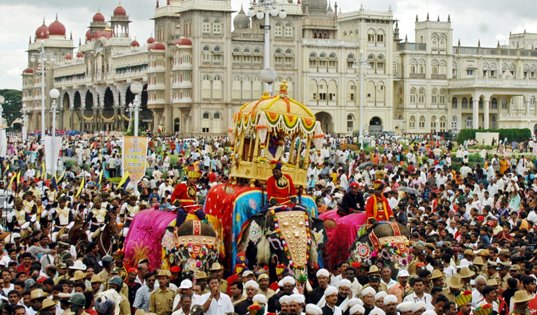Mysore Dasara celebrations are Karnataka’s and indeed south India’s best known Dussehra festivities that attract thousands of devotees and tourists alike. The Mysore Dasara celebrations conclude the nine-day Navratri festivities with a grand procession that begins from the illuminated Mysore palace. Indeed, over the decades, Mysore has become synonymous with the extravagant Dasara celebrations and the festival is celebrated with a great pomp every year. The 10-day festival ends with its last day being Vijayadashami. For the duration of Navratri and Dasara, Mysore Palace is illuminated and a procession is carried out through the streets of the city even as Mysore comes to a standstill for that one day.
Mysore, which used to be a capital for more than 600 years, is closely associated with Navratri and Dasara legends and the Chamundeshwari Temple is an important city landmark for a good reason. The city also owes its name to a tale from the Hindu mythology, one that involves Chamundeshwari, an incarnation of Durga who battled the demon Mahishasura for nine nights. On the 10th day, Chamundeshwari killed Mahishasura and the town came to be called Mahishasurana Uru (meaning, the town that Mahishasur belonged to). Soon, that name changed to Mahisur or Mysuru, which was then anglicized as Mysore. The Mysore Dasara celebrations span the duration of the epic battle and honor the nine forms of the goddess as well as the victory of good over evil. 2016 marks the 406th anniversary of the Mysore Dasara celebrations, which have more or less remained the same for all these years
The grandest and the most important day of the Mysore Dasara celebrations is, of course, Vijayadashami. Mysore Palace begins its day with a puja. Also known as the Nandi Dhwaja Puja or the puja of Nandi, Shiva’s vehicle, it begins at noon. Shiva is important to this narrative because it was he who performed the tandava holding the body of Shakti in his hands. Afraid of complete annihilation Vishnu fired his divine chakra and cut Shakti’s body into 52 parts. These parts fell all over the earth and are known as Shakti Peethas. One of them, where the hair of Shakti fell, is right here in Mysore. And that is where the Chamundeshwari Temple now stands.
Hi! I am a robot. I just upvoted you! I found similar content that readers might be interested in:
http://www.india.com/travel/articles/mysore-dasara-celebration-history-and-significance-of-mysore-dasara/
do you visited dasara
Congratulations @sukshith! You received a personal award!
You can view your badges on your Steem Board and compare to others on the Steem Ranking
Vote for @Steemitboard as a witness to get one more award and increased upvotes!